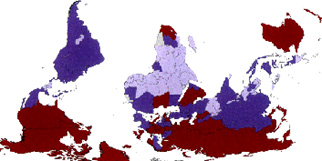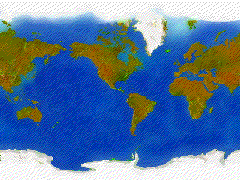 To write,
or not to write?
To write,
or not to write?Demonstrating your critical thinking through writing:
 To write,
or not to write?
To write,
or not to write?![]()
By writing about the specific, text related, concepts that emerge from the authors you are reading, you demonstrate three important features of critical thinking:
First is to explain, identify, or interpret what an authority, or any author says or advocates.
Second is to compare and contrast what she means with respect to other authors on a related or similar topic–for example contrasts between two, or among many authorities.
Third is to demonstrate the relative importance of what these authors are explicitly describing and what you implicitly think they mean, when seen in the light of new evidence or viewed from your tangent on reality.
 Meaning
. . . to
ascribe some enduring significance to actions.
Meaning
. . . to
ascribe some enduring significance to actions.
 Giving meaning to some object,
or a person's life, or a place or things we see, or to events, is an important
emotional and cognitive task that humans perform based on what they know or
believe to be true.
Giving meaning to some object,
or a person's life, or a place or things we see, or to events, is an important
emotional and cognitive task that humans perform based on what they know or
believe to be true.
The exercise of critical thinking as expressed in writing about your views and other authors' perspectives actually creates meaning with respect to the subjects that comprise a larger body of knowledge. By referring to the authorities in a subject area or a discipline, you become aware of the constellation of opinions which underlay our hidden assumptions and become, more and more, your own judge of the relative importance of certain concepts and basic means of knowing your world.
Many psychologists, such as Victor Frankel, have argued that the human need to find meaning among the many confusing and chaotic experiences of the world is what distinguishes our reason and emotions from the wild, unreasoned, and blind urges that may instinctively drive us to survive. Before Frankel, Freud argued that irrational drives to satiate desires and avoid death where the motivating factors in human life. Arguing against Freud, Adler suggested that the will to power motivated human behavior.
Certainly, in writing, one may interpret their own behavior in the world and by so doing reveal the meaning you give, or impart to your actions and the actions of others. Seeing your ideas and concepts in the light of others is an expression of sensibility important to informing your readers.
 The importance
of these following authors emerges because they define science,
they examine the movement from description to prediction, and they argue for
the consistency of knowing with certainty due to a means of constantly correcting–and thus dispelling–errors.
The importance
of these following authors emerges because they define science,
they examine the movement from description to prediction, and they argue for
the consistency of knowing with certainty due to a means of constantly correcting–and thus dispelling–errors.
Such a consistent vision arises from curiosity and a context of proof, to verify a means of knowing and the limits of reason. When we read and interpret concepts in our writing we examine the depiction of findings, and the social influences on intellectual growth. When writing about science it is advisable to describe, as well, the impact of prevailing ideas, or the zeitgeist, on scientific theories as parts of a greater worldview.
What is a bibliography, as a list of sources?
What, then, is an annotated bibliography?
Science, as a means of knowing, shares with philosophy and history the division of the world into:
detailed look at seven levels of world views
Reason vs. Empiricism
| Logically coherent |
|
Experimental |
But
as you reflect on these author's perspectives (four or more),  convey
how your view of reality, picture of nature, or worldview
either diverges from or is congruent with, or even incorporates some or all
of what the authors have suggested in their works. Each author believes there
is significant merit in understanding
convey
how your view of reality, picture of nature, or worldview
either diverges from or is congruent with, or even incorporates some or all
of what the authors have suggested in their works. Each author believes there
is significant merit in understanding
the place of human inquiry,
the findings of science, and
the means we have to know the cosmos and its living participants.
So do you agree or disagree with these authorities, as representative experts on nature and if so give some evidence for your interpretation of the natural world that surrounds you.
Mayr | Thomas | Wilson | Hardin | Darwin | Margulis | Steingraber | Carr | Keller | Watson
![]()

![]()
Science, as both a discovery and interpretation process of the world, is a product of those cultures that nourish the freedom to inquire and protect those minorities who reject accepted authority. The first casualty of repression is the capacity to detect errors. Science as a form of knowing is also a means of detecting errors and correcting false assumptions.
Culture
May be described as the entire inherited framework of material skills, traditional behavior, language, nutritional resources, mental perspective, methods of subsistence, arts, customs and spiritual beliefs that are binding among generations.
"Believing with Max Weber, that man is an animal suspended in webs of significance he himself has spun, I take culture to be those webs, and the analysis of it to be therefore not an experimental science in search of law but an interpretive one in search of meaning."
Culture has changed its meaning, despite Clifford Geertz impressive remarks, about how humans build a maze of meanings from the event-filled world around them.
Clifford Geertz, The Interpretation of Cultures, (NYC: Harper, 1973), page 5.
Geertz is a contemporary anthropologist.
The meaning of it all, ironically, is that until you give the world meaning, you don't understand how meaningless that exercise may turn out because we are all fallible, prone to making mistakes and forever able to uncover folly, or discover our errors, if only we take time and have the courage to look methodically at something and honestly reflect on its significance.
detailed look at seven levels of world views
Vocabulary | Worldview redux | More on nature | Articles | Sitemap